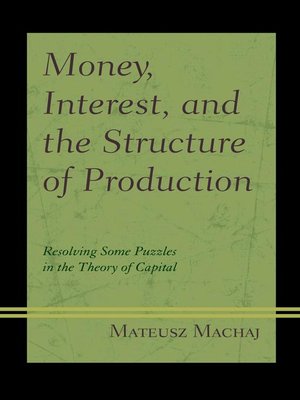Money, Interest, and the Structure of Production
ebook ∣ Resolving Some Puzzles in the Theory of Capital · Capitalist Thought: Studies in Philosophy, Politics, and Economics
By Mateusz Machaj

Sign up to save your library
With an OverDrive account, you can save your favorite libraries for at-a-glance information about availability. Find out more about OverDrive accounts.
Find this title in Libby, the library reading app by OverDrive.



Search for a digital library with this title
Title found at these libraries:
| Library Name | Distance |
|---|---|
| Loading... |
Is macroeconomic equilibrium possible under capitalism? How do economic bubbles develop? How does a monetary system influence the market mechanism? Is the return on capital a beneficial feature of the economic system? How does complexity of a capitalist organization influence the market process? Can output under capitalism be easily measured and modeled?
Such questions and many others relate to the central concept discussed in the book: heterogeneous structure of production, an envisioned theoretical connection between stages of the capitalist process. An inquiry into the functioning of a capital structure is necessary to understand the workings of the interest rate, savings, aggregate demand, and economic growth. Additionally it provides a theoretical framework to recognize consequences of monetary regimes and interest rate policies performed by the central banks.
Capital structure concepts have their place at the center of economic theory as they can provide a broad range of insights into our understanding of the real world. Money, Interest, and the Structure of Production offers key insights in that direction.
Such questions and many others relate to the central concept discussed in the book: heterogeneous structure of production, an envisioned theoretical connection between stages of the capitalist process. An inquiry into the functioning of a capital structure is necessary to understand the workings of the interest rate, savings, aggregate demand, and economic growth. Additionally it provides a theoretical framework to recognize consequences of monetary regimes and interest rate policies performed by the central banks.
Capital structure concepts have their place at the center of economic theory as they can provide a broad range of insights into our understanding of the real world. Money, Interest, and the Structure of Production offers key insights in that direction.







